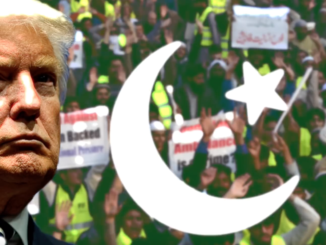
Our world is getting complicated, paradoxical, and dynamic with every single path that it takes towards evolution, modernity, diversity, hybridization, and assimilation. Various theories evolve as world politics unfolds to make sense of those concurrent events or to give reality an ideological basis and multiple approaches develop that eye these discourses, meta-narratives or phenomena. Secularism is no exception.
While secularism is diverse in its meanings and understandings, the major understanding that shadows secularism revolves around anti-clericalism i.e., suppressing the role of church in socio-political spheres, separating church and state or bringing toleration towards other established beliefs and practices just as Bryan Wilson would quote in his book “Religion In Secular Society” (1966): “The process whereby religious thinking, practices and institutions lose their social significance.”
In the case of America, the debate regarding its being secular or religious is rampant. The First Amendment as incorporated in the Bill of Rights (1789) of the US Constitution grants freedom of religion by prohibiting Congress from the establishment of religion or prohibiting its free exercise together with granting freedom to speech, assembly, press, the right to petition the government for redressal of grievances forthwith but although their constitution creates Secular Republic, the implementation of secularism has remained a problem. Religion in USA is characterized by both a wide diversity in religious beliefs and practices and by a high adherence level on geo-political basis-76 to 80% identify themselves as Christians– largest number being that of Catholics because Protestantism is divided across various lines e.g. Seventh Day Adventist, Evangelicalism and others.
But Americans Go to Church! 15% of adult population claims to have no religion and 5 % belong to other religions (Islam, Judaism, Hinduism, Buddhism and others). As per the Statista estimates of January, 2021 survey, although only 24% of Americans go to church every week, 40% consider themselves as highly religious-a number isn’t it? How would one classify such a proportion as being irreligious? Hence while its constitution separates Church and State, the USA is still a Christian Nation. US NOT recognizing any state religion eschewed from its social structure and various historical events-one of them being it would have been difficult to proclaim a state religion or designate some particular church an official status like that of UK in the essence where US alone, pertains to 200 Christian denominations alone. This is something endorsed by Wilfred McClay, a distinguished professor of Intellectual history in his enumerating in the occasion of Fifth Angle Conference on Religion, Politics And Public Life that ‘US has a unique history and their ways of ‘managing’ religion and secularism do not ascend from abstract rather concrete practice and special circumstances that it has to go through and manage’.
Political Dimension to Faith. Moving a step ahead and secularism theory jumps in to characterize those various sectors of society i.e., economic, legal, social needs to be independent of ecclesiastical influence. Political Secularism in this regard is defined as a movement separating not only government and state but religious laws with civil laws and eliminating discrimination based on religion. Many American authors were unable to ignore the unique relationship between religion and politics in the USA. Let us quote Robert N. Bellah, an American Sociologist here. His 1967 article ‘Civil Religion in America’ gives another yet not ‘secular’ term to the political dimension of religion in the USA. He analyzes the inaugural speech of John F. Kennedy (USA’s President from 1961-1963) as questioning as to how a president is even justified to utter the word ‘GOD’ in the system where Church is polarized against State. He would reach the conclusion as with Bellah that the Secular US’s constitution has not denied the political realm a religious dimension. This becomes clear when we see Americans observing ‘Sunday Holiday’, Church based marriages, and American system possessing many religious based institutions, orphanages, food banks etc. which bear socio-political influence e.g. National Council Of Churches (the largest ecumenical partnership of Christian faith groups in the USA. Together they encompass 100,000 local congregations and 40 million adherents) propagating against the appointment of Brett M. Kavanaugh as an Additional Justice to the Supreme Court of US in 2018 on the grounds of sexual abuse allegations, his being disrespectful towards members of Senate Judiciary Committee among other allegations.
How Faith Enshrines on Bipartisanism in USA? The individual belief influences the societal structure. Consider Marion Gordon Robertson, a Republican US Presidential Candidate in 1988. Being a Televangelist, he established the Christian Broadcasting Network (CBN)-an American Conservative evangelical Television Network and hosts the program The 700 Club there. In fact, the two-party system of the USA is highly religious in character-dividing secular/liberal whites from conservative/evangelical right. While Democratic party is considered secular, the Republican largely have conservative Christian base. Republican party over time and again raised fund from Ralph Reed’s Christian Coalition-the US Christian Advocacy group. In 1980, GOP social mandate was a facsimile of conservative views on sexuality, abortion, school players and the like that form the very essence of US’s secularism. However, these religious affiliations also have diplomatic essence. In 1980s and 1990s, the political tilt was towards GPO, and that also of conservative Christian base-one of the reasons being the ongoing Cold War with the atheist USSR. In that case it felt unpatriotic to them to express one’s Ambivalence towards God. However, atheism in the USA has been on the rise since the 1990s. In fact, many categorize themselves as worshippers of Deism- a claim that God exists but do not interfere in Human Affairs and not atheists.
One might assert here that American politics is at risk of becoming a religious warfare-religious vs. secularism whereby both parties with their religion-based supporters are playing Attrition Warfare.
Religion based organizations have been struggling to get their share of public funding even though laws ban direct or indirect public financing of any kind of religious activity. It becomes problematic to categorize even US Constitution in instances where US Supreme Court ruled in favor of Trinity Church, Missouri when it challenged its exclusion from state playground available to other non-profit organizations (2017) or in case of Montana Tax Credits-a decision paving way for more funding to private faith-based religious schools mostly Catholic. This decision of January 2020 is the latest expression of the Church’s involvement in Religious Affairs.
Has God Driven Out of American Socio-Political Affairs? With the defeat of former irreligious rival USSR and specifically in the aftermath of 9/11, the share of antagonists in the US has increased two-fold by 2000 and has tripled by 2010. While the 2019 Atlantic Charter enshrined upon the survey that envisaged as to how in past three decades, God was on its way out from the public sphere but not because of science but politics, there is no upending to the existence of religion as stated above. The new religions or trans-religions are emerging in the USA based on Information Technology that take Technology as their God like Kopimism and Terasem Movement. Since Modernity tends to intertwine with secularism in its rejecting religion, such IT-based religions disrupt the understandings of both modernism and secularism.
As for rising ‘nones’, they also tend to have a certain anti-religion or otherwise established customs, traditions, values, beliefs etc. – all these forms the essence of religion so why not hail atheism as a distinct kind of religion as propagating in USA and bearing socio-political influence as that of some participants of alt-group that is anti-Islam among others.
Secularism as a Misnomer. With Globalization, Secularism has become more of a misnomer with severity in nationalism and intolerance. In his ‘A LETTER CONCERNING TOLERANCE’ (1689), John Locke argued in favor of tolerance as enumerating that a government can restrict action but not a religious intent behind them and hence shall ensure tolerance and equal treatment towards all citizens and believers of all faith’. This surely is not the case of USA specifically in the aftermath of 9/11 but intolerance, specifically towards Islam existed from much earlier. This we sense forthwith as the US recognizing Israel the very first Day of its independence in May 1948 following the UNGA Resolution 181 in a complete bias to Muslims of Palestine. In the subsequent wars and conflicts between Jews and Arab, US has categorically categorized Palestine as Arab enemy culminating terror activities while expressing awe at Israel military capabilities and unequivocal support for Israel. 45 Hollywood films from 1949-2001 including 1986 film “The Delta Force” and 1996 film “Executive Decision” both about Palestine Hijacking of Airplanes in 1972 when Israeli members of Munich Olympics were taken hostage and died during rescue operations. At the same time, Israeli Forces conducted operations against Palestinians in Europe, Beirut and Israeli Air Force killed scores of people in Jordan and Lebanon during its frequent raids but there was no mention of them in the Western Media including USA, as pointed out by historian William L. Cleveland. One of the primary reasons being out of the 0.2% of the total World Jewish Population, 40% lives in USA. Same goes for Trump’s unequivocal support of extremist Hinduist Policies in Kashmir, its operations for Baathist governments (that sought Pan-Arabism) of Saddam Hussein and Mu’ammar Gaddafi and USA’s aggressive anti-Muslim immigration policies under the order named ‘PROTECTING THE NATION FROM TERRORIST ATTACKS BY FOREIGN NATIONALS’. Such sentiments with others aimed at Iran as ‘Shia penchant for martyrdom’ form the basis of Islamophobia. As a matter of fact, A secular state harbors tolerance, not extremism.
Hence to conclude, one can attribute ideology of secularism to fatuous diatribe and a concept exploited for socio-political reasons rather than polarizing religion and state-same goes for perceived American ‘exceptional’ secularism.




Be the first to comment